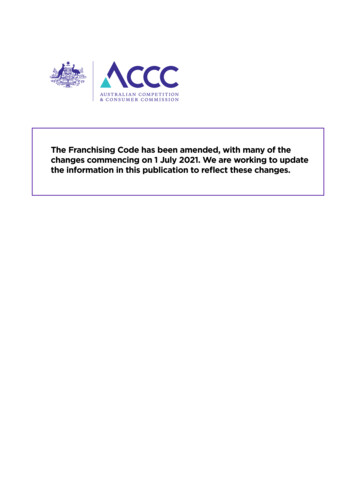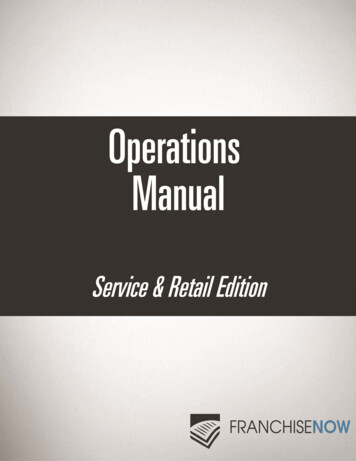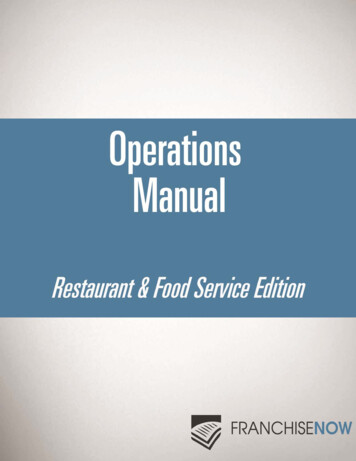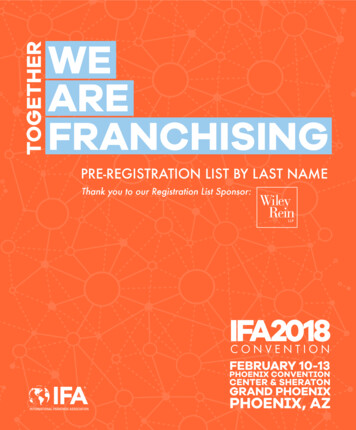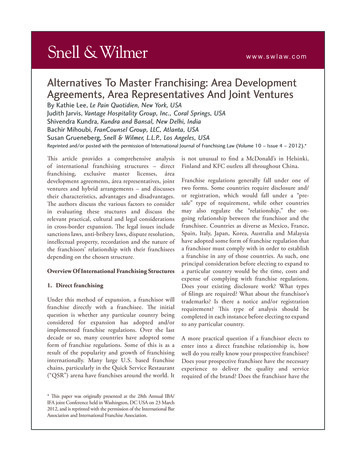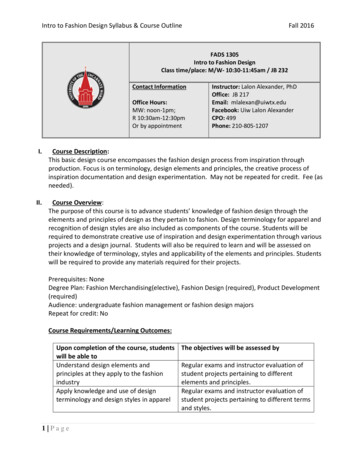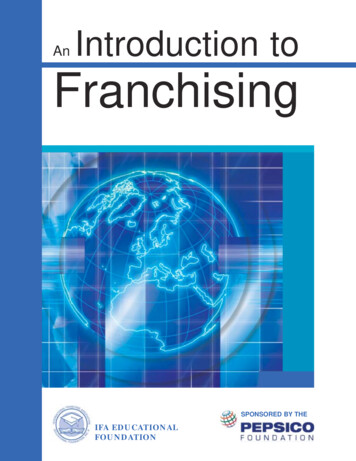
Transcription
AnIntroduction toFranchisingSPONSORED BY THEIFA EDUCATIONALFOUNDATION
2001 The IFA Educational Foundation. All Rights Reserved. No part of this book may be reproduced or transmitted in any form, by any means (electronic, photocopying, recording or otherwise), without the written permissionof the publisher. IFA Educational Foundation, 1350 New York Avenue, NW, Suite 900, Washington, DC 20005,(202) 662-0764, www.franchise.org.
AnIntroduction toFranchisingIFA EDUCATIONAL FOUNDATIONSPONSORED BY THEBy Barbara BeshelThe Money Institutewww.themoneyinstitute2000.com
FOREWORD & ACKNOWLEDGEMENTSAn Introduction to Franchising is designed to introduce young people to the fascinating world offranchising. Many people think of fast food restaurants like McDonald’s, Burger King, and Wendy’s, whenthey think of franchising. But there are many more types of franchise businesses. One out of every threedollars spent by Americans for goods and services is spent in a franchised business. Homes are boughtand sold through franchised real estate companies. The same homes can be cleaned, painted, andcarpeted through a franchise. Cars can be purchased, tuned and washed through franchises. We canhave our hair cut, clothes cleaned, pets cared for – all in franchised businesses. We can travel from onearea of the world to another through franchised businesses.The idea of this book was inspired by Ron Harrison, Senior Vice President, Global Diversity andCommunity Affairs, PepsiCo. At the time, Ron was serving as Chairman of the IFA Educational Foundation.The idea was to introduce young people to franchising, to the many facets of the franchising business, andto the many opportunities that franchising offers – for both employment and professional careers and forbusiness opportunities and business ownership. There are many opportunities for people who want toexplore careers and business ownership.We would like to express our sincere thanks to the many individuals who have worked on thisproject and to the PepsiCo Foundation for their sponsorship. Our sincere thanks to — Barbara Beshel,the author. To Catherine Marinoff, the graphic designer. To Peter Muth and Eastern Publishing for theirpermission to use graphics and materials from Franchising: Aspects of the Market Economy. To PhilipZeidman, author of Franchising: Aspects of the Market Economy, to Michael Seid and Dave Thomas,authors of Franchising For Dummies, for their assistance.We would like to express our thanks to the team of high school and college instructors who workedwith us on the pilot project – Kay Frazier, Townview Magnet School, Dallas, TX, Jacques Leblanc, YouthOpportunity Movement, CDC of Tampa, FL, Robert Rubin, Norman Thomas High School, New York, NY,Chi Yansi-Archibong, North Carolina State University, Greensboro, NC, and William Ziegler, BethuneCookman College, Ormond Beach, FL.Many thanks to Mat Burton, senior director-university relations, Students in Free Enterprise and TimCoffey, director of corporate development, Distributive Education Clubs of America, for their assistanceand for the cooperation of these organizations.Lastly, we would like to thank the Foundation staff for their efforts in coordinating the project – JohnReynolds, president, Kathryn Morgan, director of research and education, and Rose DuPont, operationscoordinator.Franchising is a wonderful way to go into business for yourself, but not by yourself. Franchising isan example of teamwork at its best, bringing together the talents of a dedicated corporate staff and management team with the hard work, zeal and entrepreneurial spirt of franchisees at the local level to serveour customers here in the U.S. and around the world. We hope that you will enjoy reading this book andthat you will learn more about this fascinating business and marketing system.Sidney J. FeltensteinChairmanIFA Educational FoundationChairman and CEOYorkshire Global Restaurants (A&W and Long John Silver’s)
Chapter 1:An Introduction ToFranchisingWhat is a franchise? What are common franchise terms?What are the alternatives to franchising?What are the advantages and disadvantages of owning a franchise?What are the legal issues in franchising?WHAT IS A FRANCHISE?A franchise is the agreement or license between two legally independent parties which gives: a person or group of people (franchisee) the right to market a product or service using thetrademark or trade name of another business (franchisor) the franchisee the right to market a product or serviceusing the operating methods of the franchisor the franchisee the obligation to pay the franchisor feesfor these rights the franchisor the obligation to provide rights andsupport to franchiseesFRANCHISE AGREEMENTFRANCHISORFRANCHISEEOwns trademark or trade nameUses trademark or trade nameProvides support: (sometimes) financing advertising & marketing trainingExpands businesswith franchisor’s supportReceives feesPays feesTHE IFA EDUCATIONAL FOUNDATIONAn Introduction To Franchising1
Types of FranchisesThere are two main types of franchises:product distributionbusiness formatProduct distribution franchises simply sell the franchisor’s products and are supplier-dealer relationships. In product distribution franchising, the franchisor licenses its trademark and logo to the franchiseesbut typically does not provide them with an entire system for running their business. The industries whereyou most often find this type of franchising are soft drink distributors, automobile dealers and gas stations.Some familiar product distribution franchises include: Pepsi Exxon Ford Motor CompanyAlthough product distribution franchising represents the largest percentage of total retail sales, mostfranchises available today are business format opportunities.Business format franchises, on the other hand, not only use a franchisor’s product, service and trademark, but also the complete method to conduct the business itself, such as the marketing plan and operations manuals. Business format franchises are the most common type of franchise.USA Today reported that the 10 most popular franchising opportunities are in these industries: fast food retail service automotive restaurants maintenance building and construction retail—food business services lodging2 An Introduction To FranchisingTHE IFA EDUCATIONAL FOUNDATION
Some popular business format franchises include:RestaurantsKFCMcDonald’sPizza HutTaco BellRetailBlockbuster VideoRadio ShackThe Athlete’s FootGNC FranchisingLodgingChoice HotelsBass Hotels/Holiday InnMarriott HotelsHealth & BeautyMerle Norman CostmeticStudiosSupercutsJenny Craig InternationalCost Cutters Family HairCareBusiness ServicesMail Boxes Etc.H & R BlockACE America CashExpressKwik KopyMaintenance/CleaningJani-King InternationalThe ServiceMasterCompanyMerry MaidsReal EstateCentury 21RE/MAX InternationalColdwell BankerResidential AffiliatesAutomotive ServiceMeineke DiscountMufflersAAMCO TransmissionsMidas InternationalPrecision Auto gDale Carnegie TrainingBarbizon School ofModelingBerlitz InternationalSylvan Learning SystemsTypes of Franchise ArrangementsBecause so many franchisors, industries and range of investments are possible, thereare different types of franchise arrangements available to a business owner.Two types of franchising arrangements: single-unit (direct-unit) franchise multi-unit franchise: area development master franchise (sub-franchising)A single-unit (direct-unit) franchise is an agreement where the franchisor grants a franchisee the rightsto open and operate ONE franchise unit. This is the simplest and most common type of franchise. It ispossible, however, for a franchisee to purchase additional single-unit franchises once the original franchise unit begins to prosper. This is then considered a multiple, single-unit relationship.A multi-unit franchise is an agreement where the franchisor grants a franchisee the rightsto open and operate MORE THAN ONE unit.There are two ways a multi-unit franchise can be achieved: an area development franchise or a master franchise.Under an area development franchise, a franchisee has the right to open more than oneunit during a specific time, within a specified area. For example, a franchisee may agreeto open 5 units over a five year period in a specified territory.THE IFA EDUCATIONAL FOUNDATIONAn Introduction To Franchising3
A master franchise agreement gives the franchisee more rights than an area development agreement.In addition to having the right and obligation to open and operate a certain number of units in a definedarea, the master franchisee also has the right to sell franchises to other people within the territory, knownas sub-franchises. Therefore, the master franchisee takes over many of the tasks, duties and benefits ofthe franchisor, such as providing support and training, as well as receiving fees and royalties.WANT ARE COMMON FRANCHISE TERMS?business format franchise – this type of franchise includes not only a product, service and trademark,but also the complete method to conduct the business itself, such as the marketing plan and operationsmanualsdisclosure statement – also known as the UFOC, or Uniform Franchise Offering Circular, the disclosuredocument provides information about the franchisor and franchise systemfranchise – a license that describes the relationship between the franchisor and franchisee including useof trademarks, fees, support and controlfranchise agreement – the legal, written contract between the franchisor and franchisee which tells eachparty what each is supposed to dofranchisee – the person or company that gets the right from the franchisor to do business under the franchisor’s trademark or trade namefranchising – a method of business expansion characterized by a trademark license, payment of fees,and significant assistance and/or controlfranchisor – the person or company that grants the franchisee the right to do business under their trademark or trade nameproduct distribution franchise – a franchise where the franchisee simply sells the franchisor’s productswithout using the franchisor’s method of conducting businessroyalty – the regular payment made by the franchisee to the franchisor, usually based on a percentageof the franchisee’s gross salestrademark – the franchisor’s identifying marks, brand name and logo that are licensed to the franchiseeUFOC – the Uniform Franchise Offering Circular, UFOC, is one format for the disclosure document whichprovides information about the franchisor and franchise system to the prospective franchisee4 An Introduction To FranchisingTHE IFA EDUCATIONAL FOUNDATION
WHAT ARE THE ALTERNATIVES TO FRANCHISING?In addition to franchising, there are two other popular methods by which businesses expand theirmarket and distribution channels: distributorships CHISORFRANCHISEECUSTOMERSIn a distributorship, the distributor usually: has a contractual relationship with the supplier buys from the supplier in bulk and sells insmaller quantities is familiar with local markets and customers may do business with many companies,more than just the supplier/producer may not receive contractual support andtraining from the supplier/producer like afranchiseeSome distribution arrangements are similar to franchises, and vice versa. A franchisee with a greatdeal of leeway in how to run the business may looklike an independent distributor. A distributor maybe subject to many controls by the supplier/producer and begin to resemble a franchise.Licensing, on the other hand, allows a licensee topay for the rights to use a particular trademark.Unlike franchises, in which the franchisor exertssignificant control over the franchisee’s operations, licensors are mainly interested in collectingroyalties and supervising the use of the licenserather than influencing the operations of the business. Check out www.licensing.org.Some popular licensors include: Netscape Communications Apple Computer Canon Inc. Woolmark Compaq ComputerSome popular distributorships include: Amway Color Me Beautiful Cosmetics Mountain Life Spring Water Knorr Soup Vendor Campbell’s Soup Vending MachinesTHE IFA EDUCATIONAL FOUNDATIONAn Introduction To Franchising5
WHAT ARE THE ADVANTAGES AND DISADVANTAGESOF OWNING A FRANCHISE?The many advantages and disadvantages of owning a franchise should be carefully evaluated beforedeciding to purchase one.Advantages: “Owning a franchise allows you to go into business for yourself, but not by yourself.” A franchise provides franchisees with a certain level of independence where they can operatetheir business. A franchise provides an established product or service which already enjoys widespread brandname recognition. This gives the franchisee the benefits of customer awareness which wouldordinarily take years to establish. A franchise increases your chances of business success because you are associating withproven products and methods. Franchises may offer consumers the attraction of a certain level of quality and consistencybecause it is mandated by the franchise agreement. Franchises offer important pre-opening support: site selection design and construction financing (in some cases) training grand-opening program Franchises offer ongoing support training national and regional advertising operating procedures and operational assistance ongoing supervision and management support increased spending power and access to bulk purchasing (in some cases)6 An Introduction To FranchisingTHE IFA EDUCATIONAL FOUNDATION
Disadvantages: The franchisee is not completely independent. Franchisees are required to operate theirbusinesses according to the procedures and restrictions set forth by the franchisor in thefranchise agreement. These restrictions usually include the products or services which can beoffered, pricing and geographic territory. For some people, this is the most serious disadvantageto becoming a franchisee. In addition to the initial franchise fee, franchisees must pay ongoing royalties and advertising fees. Franchisees must be careful to balance restrictions and support provided by the franchisor withtheir own ability to manage their business. A damaged, system-wide image can result if other franchisees are performing poorly or thefranchisor runs into an unforeseen problem. The term (duration) of a franchise agreement is usually limited and the franchisee may have littleor no say about the terms of a termination.WHAT ARE THE LEGAL ISSUES OF FRANCHISING?A good relationship between the franchisor and franchisee is critical for the success of both parties.Since franchising establishes a business relationship for years, the foundation must be carefully built byhaving a clear understanding of the franchise program. Unfortunately, understanding the legal languageof franchising can be daunting. The advice of an experienced franchise attorney should be soughtto help a prospective franchisee understand the legal issues and to protect them from makingcostly mistakes.Franchising is governed by federal and state laws that require franchisors to provide prospectivefranchisees with information that describes the franchisor-franchisee relationship.The two main franchising legal documents are the: the Disclosure Document, which may be in the format known as the UFOC. franchise agreementThe UFOCThe purpose of the UFOC is to provide prospective franchisees with information about the franchisor, thefranchise system and the agreements they will need to sign so that they can make an informed decision.In addition to the disclosure part of the document, the UFOC includes the actual franchiseagreement as well as other agreements the franchisee will be required to sign, along with the franchisor’sfinancial statements.The UFOC is designed to give you some of the information you need in order to make an informeddecision about investing in a particular franchise.THE IFA EDUCATIONAL FOUNDATIONAn Introduction To Franchising7
By law, a franchisor cannot offer a franchise until the franchisor has presented the prospective franchisee with a Disclosure Document. In fact, 14 states require franchisors to register their UFOCs with thestate or to notify them that they will offer franchises before they begin to conduct any franchising activity in the state.The UFOC includes information about:the franchisorthe company’s key staffmanagement’s experience in franchise managementfranchisor’s bankruptcy and litigation historyinitial and ongoing fees involved in opening and running the franchiserequired investment and purchasesterritory rightsresponsibilities of the franchisor and franchiseeother franchisees in the system with contact informationReceipt of the UFOC is governed by the “ten-day rule.” This is a cooling-off period in which franchisors must give prospective franchisees 10 business days to think about their decision before they areallowed to sign the franchise agreement.The Franchise AgreementThe franchise agreement is more specific than the UFOC about the terms of the relationship between thefranchisor and franchisee. A typical franchise agreement may include specifics about: the franchise system, such as use of trademarks and productsterritoryrights and obligations of the parties: standards, procedures, training, assistance, advertising, etc.term (duration) of the franchisepayments made by the franchisee to the franchisortermination and/or the right to transfer the franchiseThe franchise agreement is the legal, written document that governs therelationship and specifies the terms of the franchise purchase. Like the UFOC,the franchise agreement also enjoys a “cooling off” period. Prospective franchisees are legally entitled to have the final franchise agreement for at least 5business days before they are allowed to sign. This gives them time to reviewand consider the terms of the agreement.8 An Introduction To FranchisingFranchise AgreementTHE IFA EDUCATIONAL FOUNDATION
Chapter 2:Beginning Your SearchWhat are your options when you begin your business?How do you investigate your options?How do you investigate a franchise?What are your criteria for selecting a franchise?WHAT ARE YOUR OPTIONS WHEN YOU BEGIN YOUR BUSINESS?Once you make the decision to start your own business, you need to decide whether you want to be anindependent business owner or a franchisee.Options for beginning a business: start a new business buy a new franchise buy an existing franchiseStarting A New BusinessAdvantagesDisadvantages usually lower start-up cost– requires more time and energy independence and creative freedom– high risk of failure freedom with location and procedures– takes longer to become profitable no inherited problems from an existing business– financing may be more difficult to obtainTHE IFA EDUCATIONAL FOUNDATIONAn Introduction To Franchising9
Buying A New FranchiseAdvantages reduced risk of failure proven methods and products start-up assistance on-going training and support local, regional and national advertising collective purchasing power research and development association and synergy with other franchisees easier to obtain financingDisadvantages costs more (fees, royalties, supplies) smaller profit margins lack of independence and freedom difficult to achieve redress iffranchisor fails to meet obligations a franchisor’s problem may becomeyour problemBuying An Existing FranchiseAdvantages the business is already up and running risk and uncertainty may be reduced the basic infrastructure is in place: established location existing customers and reputation employees vendors policies and procedures cash flow no start-up period—quicker profitability easier to obtain financingDisadvantages tangible limitations: design problems location problems merchandise problems intangible limitations: customer or employee ill will pricing problems inadequate procedures lease problems potentially higher costs to buy legal liability in inheriting lawsuitsHOW DO YOU INVESTIGATE YOUR OPTIONS?Regardless of whether you choose to become an independent business owner or become a franchisee,research is the single most important activity in making your decision. Without adequate information, youmay end up making the most costly decision of your life.? AvenueSteps for beginning a business: What business? Is there a market? Can you afford it? Can you make enough money to make it worthwhile?10 An Introduction To FranchisingTHE IFA EDUCATIONAL FOUNDATION
What Business Should You Start?“Find something you love to do and you’ll never have to work a day in your life.”—Harvey MackaySometimes people start a business because they think they’ll make a lot of money, only to find out thatthey do not enjoy the business. The adage, “know thyself” certainly applies here. You should start a business in an industry that you will enjoy for the next 10 to 15 years.Ask yourself: What do you like to do? (interest and hobbies) What do you know how to do? (experience) What do you do well? (special skills and talents) Which industry(s) involve your interests and use your skills and talents?(For ideas, refer to IFA’s Franchise Opportunities Guide’s listing of industriesin the table of contents or visit www.franchise.org) What products or services could you sell in this industry(s)? Would you rather sell a product or service? What products or services would you like to sell the most?Determine If There Is A MarketAll successful businesses must:satisfy a need orsolve a problem orrespond to a trendBefore starting any business, determine if there is a market for your product or service.Conducting market research: How many potential customers are in your area? Will your product or service sell? What need does it satisfy? What problem does it solve? What trend or fad does it address? What should the appropriate pricing be? Who are your competitors? How many competitors do you have? What do they offer? How will your product or service be unique? What marketing niche can you capture?THE IFA EDUCATIONAL FOUNDATIONAn Introduction To Franchising11
Determine If You Can Afford To Start A BusinessMAKE PROFIT POTENTIAL YOUR MOSTIMPORTANT CONSIDERATION!In order to start a business, you have to have money!In order to stay in business, you have to make money!The single most common reason new businesses fail is that they did not have enough money to beginwith! Don’t forget the old business adage: “It takes twice as long and costs twice as much!”Costs to consider: Estimate your start-up costs: location design and construction professional fees equipment and fixtures furniture opening inventory and supplies insurance Pre-opening labor Opening advertising and promotion Estimate how much working capital you will need (the money you will need until the businessbecomes profitable—include your living expenses, if necessary) salaries insurance utilities advertising rent interest on a loan, if applicable Brainstorm where you might be able come up with money: yourself family friends savings and investments a partner selling personal assets loans12 An Introduction To FranchisingTHE IFA EDUCATIONAL FOUNDATION
Determine If You Can Make Enough Money To Make The Venture Worthwhile Estimate the profit potential for the business: income expenses profit (income – expenses) Think about the amount of time and energy it will take to make the business successful. Make a decision as to whether you think you can make enough money to make the entire ventureworth your time and energy!HOW DO YOU INVESTIGATE A FRANCHISE?Like starting any business, buying a franchise involves a risk. Studies show that successful franchisees: conduct their own marketing research use their own financial and legal advisors develop thorough marketing and business plans have prior work experienceProspective franchisees must devote a vast amount of time researching the franchises available and evaluating the strength of the franshisors.Find out what franchises are available: Read directories:The Franchise Opportunities GuideThe Executives’ Guide to Franchise OpportunitiesBond’s Franchise GuideThe Franchise AnnualFranchise HandbookHow Much Can I Make? Read articles and ads in business publications:Inc.: www.inc.comEntrepreneur: www.entrepreneurmag.comFranchise Times: www.franchisetimes.comFranchising World: www.franchise.orgFranchise Update: www.franchise-update.comThe Wall Street Journal: www.wsj.comUSA Today: www.usatoday.comThe New York Times: www.nytimes.comTHE IFA EDUCATIONAL FOUNDATIONAn Introduction To Franchising13
Attend trade shows and expositions: IFE (International Franchise Expo) is sponsored by the International Franchise Association (IFA:202-628-8000 or www.franchise.org) and is the world’s largest gathering of franchise companies. The U.S. Small Business Administration and Small Business Development Centers (SBA:www.sbaonline.sba.gov/sbdc/) Conduct research on the internet: Federal Trade Commission — www.ftc.gov/bcp/menu-fran.htm Small Business Administration — www.sba.gov International Franchise Association – www.franchise.org Entrepreneur Magazine — www.entrepreneurmag.com Franchise Update Magazine — www.franchise-update.com IFA Franchise Opportunities Guide – www.franchise.org Franchise Handbook — www.franchise1.com Source Book Publications — www.worldfranchising.comEvaluate the strength of the franchisor: Investigate the franchisor’s history: How long has the franchisor been in business? How many current franchisees are there?niota What is the failure rate of the franchisees?luate EvaCandid Are there any pending or past lawsuits and what have they been for? Does the franchisor have a reputation for quality products or services? What is the franchisor’s financial health (get its Dun & Bradstreet rating) credit rating profitability reputation What are the earnings claims and profit projections? On what are they based? Are the projections based on franchisor or franchisee-run units? How long have the units used for projections been in business? What is the background of the principals/management? What is their business experience? Have they personally had any bankruptcies? Have they personally had any recent litigation?14 An Introduction To FranchisingTHE IFA EDUCATIONAL FOUNDATION
Carefully study and obtain professional advice concerning the franchisor’s UFOC and franchise agreement, paying special attention to: costs term (duration of) agreement and renewal provisions and conditions termination clauses franchise territory procedures and restrictions training and assistance earnings potential - gross sales, net profit expansion plans How fast do they plan to grow? Where do they plan to grow? Do they have a business plan for your area of location? What is their analysis of the competition in your area? How many units are being planned for your area? Why that many? How much is going to be spent in regional advertising in your area? Visit and talk with existing franchisees, emphasizing the: level of training quality of products or service level and promptness of support operations and quality of the operations manuals earnings potential/claims any problems or difficulties with the franchisor Visit/talk with franchisees who have left the system and find out why they left. Visit the franchisor’s headquarters: meet the support team review the operations manuals and see if you can sit in on a training class Go to work in an existing franchise for a couple of weeks and really get to know the: system manuals training program support earnings potential Seek the advice of an attorney and accountant who specialize in franchises.THE IFA EDUCATIONAL FOUNDATIONAn Introduction To Franchising15
WHAT ARE THE CRITERIA FOR SELECTING A FRANCHISE?Before buying any business, you must carefully consider many factors that are critical to your success: costs training and support your abilities franchisor’s experience demand and competition expansion plansCosts: How much money will this franchise cost before it becomes profitable? Can I afford to buy this franchise? Can I make enough money to make the investment worth my time and energy?Your Abilities: Do you have the technical skills or experience to manage the franchise? Do you have the business skills to manage the franchise?Demand: Is there enough demand in your area for the franchisor’s products or services? Is the demand year-long or seasonal? Will the demand grow in the future? Does the product or service generate repeat business?Competition: How much competition do you have, including other franchisees? Are the competing companies/franchises well established? Do they offer the same products and services at the same or lower prices? Is there a specialty or niche you can capture?Brand Name: How well known is the franchise name? Does it have a reputation for quality? Have any consumers filed complaints with the local Better Business Bureau?Training and Support: What kind and how much training and support does the franchisor provide? Do existing franchisees find this level of training and support adequate?Franchisor’s Experience: Has the franchisor been in business long enough to have established the type of business strengthyou are seeking?Expansion Plans: Is the franchisor planning to grow at a rate that is sustainable?16 An Introduction To FranchisingTHE IFA EDUCATIONAL FOUNDATION
Chapter 3:Navigating the Paper TrailWhat are the key subjects in the franchise agreement?What are the key items in the Disclosure Document (UFOC)?What do you have to know about financial statements?Where can I get help?WHAT ARE THE KEY SU
authors of Franchising For Dummies, for their assistance. We would like to express our thanks to the team of high school and college instructors who worked . A franchise is the agreement or license between two legally independent parties which gives: a person or group of people (franc

